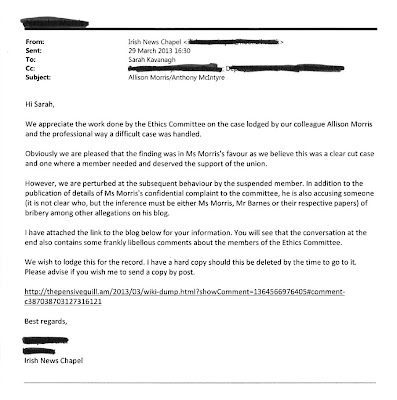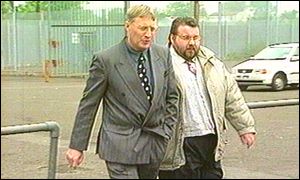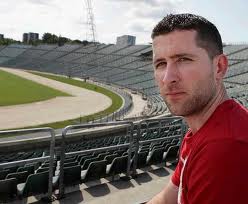TRANSCRIPT: Radio Free Éireann interview with Richard O'Rawe, author of Blanketmen
Radio Free Éireann
WBAI 99.5 Pacifica Radio
New York City
Saturday 17 August 2013
Via telephone from Belfast: Sandy Boyer (SB) interviews Richard O'Rawe (RO), author of
Blanketmen: An Untold Story of the H-block Hunger Strike, about the Democratic Unionist Party's unilateral decision to cancel the proposed Peace and Reconciliation Centre at the Long Kesh prison site. Thanks as always to our transcriber who rises to the occasion every time.
(begins 1:13 EST)
Sandy Boyer (SB): We are going over to Belfast to speak to Richard O'Rawe. Richard, thanks very much for being with us.
Richard O'Rawe (RO): It's a pleasure, Sandy. Thank you so much for having me.
SB: Richard, you were on the blanket. You were the PRO, Public Relations Officer, for the hunger strikers. You knew men who died on hunger strike.
RO: Yes.
SB: How does it make you feel that there can't even be a Peace and Reconciliation Centre where they died?
RO: Well it makes me feel very, very angry to be quite frank, Sandy, because it is indicative of the myopic, tunnel vision view that Unionists have of what happened during the struggle.
I mean the reality of the matter is that ten very selfless men, ten heroes gave their lives in Long Kesh for us, their fellow blanketmen, who were on protest against criminalisation.
And they gave their lives and ended up with a horrific death and we're not even allowed to visit (the site).
They're actually talking about rasing the hospital wing in which Bobby Sands and the other nine hunger strikers died. They're talking about rasing it to the ground – an attempt to wipe out all memories of the hunger strikers.
And I think it's absolutely diabolical.
SB: Richard, you would think that no one could be against peace and reconciliation. Here we have a saying that it's “like Mom and apple pie”.
But suddenly, the Democratic Unionist Party from out of nowhere – and despite the fact they agreed to it already – says you can't do it. You can't have any monument to the hunger strikers.
RO: Well, it's not even that Sandy because they're now talking about dismantling the monuments to Republican IRA Volunteers, Republican freedom fighters, throughout the North.
What's actually happening is that the Unionist/RUC-type section of this population are of the opinion that they were the only people who suffered here – that they were the only people who had legitimate dead – that everyone else who died here were gangsters or terrorists or whatever you want to call them.
They're actually now coming to a position where they're trying to deny Republicans any outlet at all – they're denying them the right even to show respect for their own dead.
SB: But this is just adding insult to injury.
There's been a sustained Unionist offensive, I would say, against Nationalism, right back – you had the flag protests – where they insisted the Union Jack has to fly over the Unionist Belfast City Council even more times than it flies over Buckingham Palace!
They're saying: we're more loyal than the Queen herself.
But then you got – last week – Máirtín Ó Muilleoir, the Sinn Féin Lord Mayor of Belfast, tried to dedicate a park – he got attacked by a mob, a Protestant mob frankly...that's all you can call it.
His Unionist colleagues on the Council stood by...did nothing.
And of course last week you had the attempt to commemorate internment without charge or trial and a Loyalist mob just blocked it from getting anywhere near the city centre. So this is not just an isolated incident.
RO: No, it's not. But at the heart of all of those incidents is a supremacist attitude.
And it's an attitude that is vibrant within the Unionist population. And that has never changed from the formation of the state of Northern Ireland which, we must remember, was a gerrymander in that the Six Counties was deliberately (and) geographically picked because it would ensure that there would always be a Unionist majority within.
And from that came this supremacist attitude. And that supremacist attitude hasn't gone away simply because there's a peace process. It is still there and they are of the view – and that's why they wouldn't let anyone march down – weren't allowed on the main street in Belfast – because in their view that's their street.
They can walk up and down it every twelfth of July and any time the notion takes them. But Nationalists are not allowed to walk down it. And if they try to there will be riots...as there was.
And it's the same with the Union Jack flying over Belfast City Hall. The Union Jack is their flag. Someone suggested: now why not put up the Tricoulor, the Irish flag, up beside it – they went absolutely nuts. Then someone else suggested well why not put all the flags of the European Union up – and again they went nuts.
The only flag that they wanted is the Union Jack because the Union Jack is a supremacist flag. And it's a flag that tells Nationalists that they're second-class citizens. And that is really the crux of the matter.
They have a supremacist attitude. It hasn't gone away and it's not going to go away. They have no interest in sharing power. They're doing so because they have to.
But they are absolutely convinced that Nationalists are second class citizens and should be treated as such.
SB: And are being treated as such.
RO: And are being...absolutely!
SB: But Richard, what happened to parity of esteem and power sharing?
Look, you've got Sinn Féin, the largest Nationalist/Catholic party, is in government with the Democratic Unionist Party, Ian Paisely's party, the ones who just canceled this Peace and Reconciliation Centre. I can't get over it. I can't help thinking no one could be against peace and reconciliation. But – How come?
You're supposed to have parity of esteem. That's what they tell you!
RO: There is no parity of esteem.
You made a point earlier I'm going to come back to: This was going to be a peace centre. This wasn't going to be a monument to the hunger strikers.
Sure the hunger strikers died in Long Kesh but there was also prison officers who died during the struggle, who were shot dead during the struggle by the IRA, who were going to be remembered as well. There was all sorts of different outlets. So in fairness, it probably would have been a legitimate peace centre. However, they scuttled it.
The fact of the matter is that they scuttled it because they can.
In actual fact what they did (was) they checkmated Sinn Féin. They just came out and they put it up to Sinn Féin...we're closing this...this is never going to happen...see, this business...it's put back until Richard Haass, the American diplomat, comes over.
It will never, ever be opened in my view.
The fact of the matter is they pulled the plug on it because they could. Because it was a step too far for them and they would not have ever been comfortable with it.
They don't want the IRA remembered in any shape or form. And Sinn Féin now have an awful, awful dilemma: they either swallow this, in other words they say: well there's nothing we can do about it and they march on and accept this second-class sort of citizenship.
Or, the alternative to that, is to pull down the institutions at Stormont. And I don't think they're going to do that.
So the reality is they're going to have to just accept it and they will. I've no doubt about that.
SB: But, Richard, Sinn Féin has been, I don't know...for months and months if not years...telling everybody there was going to be a Peace and Reconciliation Centre there. It will be in effect, if not in name, a monument to the hunger strikers. That's what they've...I haven't researched it...I don't know how many months they've been saying it...but a good long time.
RO: Yes, they have. The DUP, even prior to this being scuttled, the DUP was saying the exact opposite. The both of them can't be right.
The DUP was saying there would be no mention of hunger strikes. Jeffrey Donaldson actually said it on television. There would be no mention of hunger strikes in this Peace and Reconciliation Centre.
They were actually diluting the whole hunger strike event. Had it not been stopped they were of the view that they were going to dilute it to the point where it would not be a monument to the hunger strikers.
So no matter what Sinn Féin said the DUP would have had the upper hand in this one. They did have the upper hand. And now they've pulled the plug on it.
SB: This sounds like a microcosm for the peace process.
RO: It is.
SB: You tell Loyalists what they want to hear, Protestants what they want to hear. You tell Nationalists, Catholics what they want to hear and then eventually, reality intervenes.
RO: You're absolutely right. The peace process itself is ambiguous because nobody really know what it means.
We could have had power sharing, as we know, back in 1974 and we had it at Sunningdale and it was pulled down. But setting that aside, we now have power sharing again but it's a power sharing that is forced.
And there's no doubt that Unionism at its core does not believe in power sharing.
They believe that as they are the majority of the people in this gerrymandered state they are entitled, as they have always been, to be at the center of government – to be in control of the government.
And that power sharing, to an extent, has been forced on them. But they still have the upper hand.
You can talk about the peace process – yeah – there's nobody's being killed – this dissident campaign, which in my view, is nonsense and should be stopped immediately – but this dissident campaign is not having a major impact politically.
But nonetheless, Sinn Féin – they're like drinking ducks, they have no choice but to keep on swallowing their pride, swallowing their pride because to do something against it – the only radical thing that they could do would be to walk out of government – and they're never going to do that. In my view they're never going to do that.
They didn't do it over internment, when Marian Price was interned, or that young man Coney is interned.. or Corey, I beg your pardon, Martin Corey...he's interned. And there's other people in...
SB: Martin Corey's interned for years and there's no prospect of his getting out.
RO: And they're doing absolutely nothing for him.
The radical Sinn Féin of twenty years ago or twenty-five years ago would have been mobilising on the streets, would have been absolutely making a nuisance of themselves – these guys don't want to do nothing. They don't want to rock the boat. They're getting good wages. They're getting a good living.
Those who are with them are getting the handy jobs, etc – well paid jobs – and they don't want to rock that boat. And they don't want to confront the sectarianism of Unionism. It's there. They don't want to confront it.
So what they're going to do now is they're going to swallow it and say that's tough.
SB: Well you know, Richard, if you read
The Belfast Telegraph – the mainstream Northern (Ireland) newspapers – the “respectable” press, they're all saying – Oh my God! there's a crises in the peace process. Sinn Féin has been insulted.
The DUP didn't even give them a call and say: just want you to know, boys, we're going to cancel this. They put out the press release and said: that's it!
They asked Martin McGuinness, who's the Deputy First Minister, if he was going to talk to the Unionist First Minister of Northern Ireland. He (McGuinness) said: well, first of all – he's in Florida so I can't really reach him and even when he's in Belfast I can't really reach him.
So what future can there be if they can do this to Sinn Féin and Sinn Féin says well we can't even get in touch with these people – what does that say about this coalition government?
RO: Well, it shows you how useless, not useless – useless may not be the right word, how inept Sinn Féin is and how inadequate their involvement with this process is. Stormont itself is a talking shop. Westminster does most of it – they give them the money and all they do is hand it out.
But the point of the matter is, Sandy, and it keeps coming back to the same point and Robinson demonstrated it very vividly when, as you say, he didn't even take the bother or he didn't even have the manners to tell Martin McGuinness that he was going to pull the plug on this – McGuinness heard it when all the rest of us heard it on the news.
So you have to say to yourself: What respect has Robinson for his co-counsel? For his fellow leader? There's absolutely none.
Again, it's done because he still has this supremacist attitude that Nationalists, per say, are people who are not worthy of respect and they're certainly not worthy of having equal status to the Unionists in this statelet.
SB: Richard, but what does it say about the future of this coalition?
Because it seems to me, if Sinn Féin can't get a...now it's symbolic but...a little, tiny – and I would think – uncontroversial thing like a Peace and Reconciliation Centre – I keep thinking that – a Peace and Reconciliation Centre – nobody could be against that – but they can't even get that. So what are they able to get?
RO: They're not going to be able to get anything.
Ultimately Peter Robinson knows that – and he has this well thought out – he knows that Sinn Féin aren't going to walk away from this because if they walk away they've nowhere to go and he knows they're going to have to come back – probably come back to the same situation. So he knows that there's nothing they can do about it.
The only way that the situation would change would be for Sinn Féin to walk out – that would be the drastic measure that may be needed to maybe interject some reality or shake up Unionist thinking. But they're not going to do that.
Sinn Féin will go on and they will go on taking the slaps in the face. They will go on taking the insults. They will come off with jargon that tries to allay the justifiable concerns of their constituents but they will stay in power, Sandy, because don't want to give it up under any circumstances.
And Peter Robinson knows that.
And he knows that these guys – at their core – haven't got a great sense of moral fibre – that they'll do whatever they have to do to stay in power – and if that involves swallowing pride again and again and letting things absolutely spiral out of control in terms of state security things like internment, etc they will just take it. And Robinson knows that. And that's why he can be so flippant and so bad mannered.
Sinn Féin knows there's no choice but to take it.
SB: Richard, it seems to me that having gotten away with this, having gotten away with the attack on the internment march, having gotten away with repeated attacks on Nationalist areas like Ardoyne and, as you say, with interment, it would seem to me that there's going to be more attacks on the Nationalist community. It's going to get even worse!
RO: The violent streak in Unionism in my view – and I'm almost loathe to say this – it seems to me that paramilitary Unionism isn't that far away from actually lifting up guns again and starting to kill people.
Because alot of these riots are being led by the paramilitaries, the paramilitaries that led the UVF etc, they're very much into (this)...and it wouldn't be beyond the imagination of some of these guys to say: come on, we'll go and shoot a Catholic.
There's the potential there, Sandy, for things to get worse.
I don't see it getting any better. I don't see how the issues that are so salient now are going to be removed.
For example, the Unionists want to parade and walk wherever the hell they want irrespective of whether it upsets other people or not. They don't want the Peace and Reconciliation Centre. They don't want Catholics walking in the city centre of Belfast. They actually don't want IRA monuments now throughout the country. They don't want the IRA to even honour their dead.
This is the reality. It's humiliating.
It's humiliating to be a Nationalist here because we all thought that (with) the Good Friday Agreement we had moved into a new era and the mindset of the people was changing.
And we now know that that was an illusion.
The mindset of Unionism has not changed one iota – that it's still “croppy lie down” – that's the way they think and that's the way they're actually acting. And that's what we're seeing...that's what we've seen right throughout the Summer and what we've seen for years.
And the problem is that Sinn Féin is lying down. Sinn Féin has no teeth. And they know that.
SB: Before I let you go – I was talking to Eamonn McCann, the journalist whom you know very well...
RO: Yeah, I know Eamonn well.
SB: And he was saying: You know, I was going to write that if this keeps up the next step will be assassinations. He said then I didn't do it because I thought I might be putting the idea in somebody's head.
Is that what we're coming to?
RO: I was of the same view as Eamonn and that's why I said that I'm reluctant to say this. I mean, I said it there two minutes ago but I think that is not that far away. I think that some of these eejits would think nothing of lifting a gun and shooting some Catholic and come up with some blind reason for it.
I hope, I pray with all my heart that it doesn't. But I'm saying that it's not beyond the realms of possibility. Like Eamonn, I hope I'm wrong...this is one where I really do hope I'm wrong...I mean, the situation is very fraught, very, very fraught at the minute and it's very, very dangerous.
Everyone's pinning their hopes on Richard Haass. I tell you – he would need to be a magician because only a magician could pull this off.
SB: Well, Richard, we'll get back to that and thank you very much. We really appreciate you coming on.
RO: You're welcome, Sandy. Thank you so much for having me. It was lovely to talk to you again.
(ends 1:35 EST)

 The author is a good friend who lives in Belfast, so it is not that often that we get to see him these days. When we lived up North he would call at our home, often late in the evening when there was a lull in his work schedule, armed with 2 litres of milk, a hint that a cup of tea would not go unrewarded. The reward was an hour or two of his chat as he talked and reminisced.
The author is a good friend who lives in Belfast, so it is not that often that we get to see him these days. When we lived up North he would call at our home, often late in the evening when there was a lull in his work schedule, armed with 2 litres of milk, a hint that a cup of tea would not go unrewarded. The reward was an hour or two of his chat as he talked and reminisced. This weekend is simply not the same, no matter how it ultimately turns out. The reason is quite simple: last week saw the finale of two great television series. We love nighttime television here, particularly when the viewing is Scandinavian crime fiction drama. What made these two non-Nordic series so potent was the quality of the female cast.
This weekend is simply not the same, no matter how it ultimately turns out. The reason is quite simple: last week saw the finale of two great television series. We love nighttime television here, particularly when the viewing is Scandinavian crime fiction drama. What made these two non-Nordic series so potent was the quality of the female cast.


 Good Friday, The Death of Irish Republicanism is available at these online outlets:
Good Friday, The Death of Irish Republicanism is available at these online outlets: